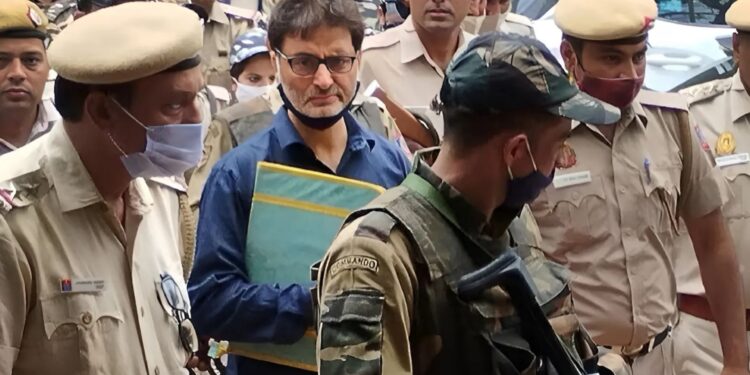The Supreme Court on Thursday directed Yasin Malik, the convicted terrorist, to respond to the Central Bureau of Investigation’s (CBI) plea seeking the transfer of his trial in two major cases from Jammu to Delhi. The CBI filed the petition to ensure the safety of the trial proceedings, citing the significant security risks involved in transporting Malik from Tihar Jail, Delhi, to Jammu. Justices Abhay S. Oka and Augustine George Masih have given Malik time until December 14 to file his response.
This petition arose after a Jammu trial court had ordered Malik’s physical presence for cross-examination in two high-profile cases: the 1990 killing of four Indian Air Force personnel and the abduction of Rubaiya Sayeed, the daughter of former Jammu and Kashmir Chief Minister Mufti Mohammad Sayeed. The Jammu court had sought Malik’s appearance for cross-examination, but the authorities expressed concerns over the security implications of transporting him.
In a previous hearing, the Supreme Court had proposed an alternative to moving Malik physically—suggesting that a makeshift courtroom could be set up inside Tihar Jail, where cross-examination could be conducted through videoconferencing. Solicitor General Tushar Mehta, representing the CBI, confirmed that Tihar Jail already has a fully equipped courtroom with videoconferencing facilities, and past proceedings have been conducted there. He also informed the court that the CBI had filed two applications, including one requesting the transfer of the cases from Jammu to Delhi.
The Supreme Court issued notices in response to the CBI’s applications and scheduled the next hearing for December 14. Notably, in April 2023, the Supreme Court upheld the Jammu court’s order requiring Malik’s physical appearance.
Malik was physically present in the Supreme Court in July 2023 after notifying jail authorities of his desire to attend the hearing. This raised concerns about a security lapse, with Solicitor General Mehta writing to Home Secretary Ajay Bhalla about the matter. In response, Malik’s presence in the court was seen as a serious security breach, leading to further scrutiny of his physical appearance.
More recently, Malik approached the Delhi High Court, seeking medical treatment at AIIMS. He claimed that the authorities were preventing his physical production in court under the guise of an order passed under Section 268 of the Code of Criminal Procedure (CrPC), which restricts the transfer of prisoners from jail. Malik has urged the High Court to lift the restrictions and allow his physical presence in court when necessary.

















